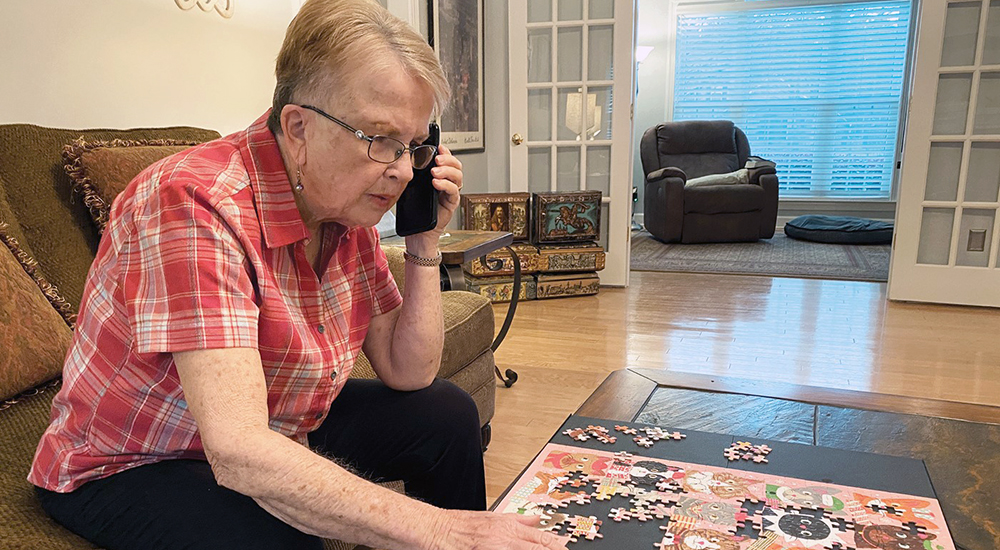Have you ever forgotten why you went into another room or misplaced items you could swear you just had? Or maybe you didn’t know how to start a project or how to complete it.
Everyone has these kinds of glitches once in a while, but problems with cognition (the term for thinking, learning and remembering) can be worse for Veterans living with schizophrenia, schizoaffective disorder, bipolar disorder or another serious mental illness (SMI).
For Veterans diagnosed with an SMI, cognitive symptoms may lead to difficulty with work or school, trouble learning new skills and maintaining social connections, and a reduced quality of life overall.
VA researchers are currently studying how different cognitive training exercises can help Veterans with an SMI. While those studies are underway, Veterans with an SMI may consider training programs available online to anyone with a computer. Continue reading to learn how to get the best treatment and avoid getting scammed.
What is cognitive training?
Sometimes called “cognitive remediation” or “cognitive rehabilitation,” cognitive training aims to improve concentration, memory and problem-solving.
Just as there are different types of physical exercise, there are different approaches to cognitive training. For some training exercises, trainees complete progressively more difficult computer exercises with sounds and visuals, akin to building a muscle by adding more and more weight to regular exercise. Other training activities involve learning communication, social and problem-solving skills or involve using these skills in a real-world environment.
VA researchers are looking into which approaches work best for Veterans with an SMI. Not every approach will work for every Veteran so it’s important that you and your provider find an approach that fits your needs.
Results from VA research into cognitive training
Researchers at the VISN 22 Mental Illness Research, Education and Clinical Center (MIRECC) found that, for about two-thirds of the Veterans tested, a computerized, targeted cognitive training program:
- Significantly reduced psychiatric symptoms (e.g., hallucinations)
- Increased participation in group therapy and social activities
- Improved verbal learning, attention and memory.
However, nearly 1 out of 3 test participants did not benefit from the treatment, which led researchers to investigate further. They found that brain function, measured before treatment, indicated which Veterans would respond to the training. The reasons behind that finding are the subject of ongoing study.
In addition, researchers are testing whether adding the medication memantine would improve the effects of cognitive training. The Food and Drug Administration has approved memantine for the treatment of cognitive dysfunction in people with Alzheimer’s disease.
Researchers have determined that Veterans can increase the chance that cognitive training will work for them – even before they start the training – by getting regular sleep, eating healthy, exercising and avoiding alcohol and other substances. A home environment that supports cognitive rehabilitation can also increase Veterans’ likelihood of success.
Resources… and some recommended programs
Cognitive training is currently not available through VA and can be difficult to find, but your provider may be able to help you find a research study that is seeking participants. When looking to participate in a program, bear a few things in mind:
- Stick to programs that are being studied at VA facilities or research universities
- Make sure the program is backed by research published in peer-reviewed scientific journals
- Find programs that have been studied specifically for use by people with SMI
There are also commercial cognitive training programs for those who want to do it on their own, but beware – many programs have misleading advertisements, exaggerate their results or offer unhelpful video games that they claim to be cognitive training tools.
VA is still in the process of developing its own programs. In the meantime, consider these provider-recommended training programs:
To learn more about the types of cognitive training and whether they may help you, download this educational handout from the VISN 22 MIRECC.
Topics in this story
More Stories
Veteran Byron Potier weighed almost 300 pounds and was tired and lethargic. He was the perfect candidate for gastric sleeve surgery.
How much do you know about VA care, benefits and services? Don’t miss out on what you've earned—check out the "2025 VA Federal Benefits Guide for Veterans, Dependents, Survivors, and Caregivers" handbook to learn more.
Feeling stressed? Your breath can help you relax and focus. Take 3 minutes to reset and prioritize your well being for this week's #LiveWholeHealth practice.







I’m very interred in this program, I have already been diagnosed with a cognitive issue on the Sevillian side.